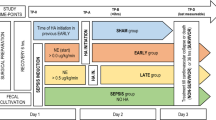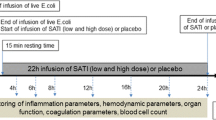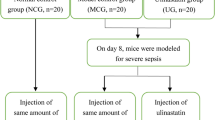Abstract.
Objective: We sought to determine the lowest dose of recombinant human tissue factor pathway inhibitor (TFPI) that can provide protection from lethality in a rabbit model of septic shock. Methods: Sepsis was induced in New Zealand white rabbits by intraperitoneal implantation of 7.0 ml of a solution containing hemoglobin (4.8 g/dl), porcine mucin (6 g/dl), and 0.8–1.4×104 viable Escherichia coli (strain O:18 K+). Gentamicin (5 mg/kg) was administered 4 h following surgery, and this dose was repeated every 12 h for 3 days. Beginning 4 h following the induction of sepsis, animals were treated with a bolus (1 ml) plus a continuous infusion (100 ml over 24) of either TFPI (various doses) or its vehicle. Four different doses of TFPI were studied, and each experiment included a contemporaneous control group. The primary outcome parameter was survival time. Results were analyzed using the Wilcoxen log rank test. Results: The average survival time for rabbits treated with the highest dose of TFPI tested (50 µg/kg bolus and 0.5 µg/kg per minute infusion) was 118 h, as compared to 81 h in vehicle-treated controls). The average survival time for septic rabbits treated with a much lower dose of TFPI (100 ng/kg bolus and 1.0 ng/kg per minute infusion) was 119 h as compared to 57 h in surviving vehicle-treated controls. Treatment with an even lower dose of TFPI (10 ng/kg bolus and 0.1 ng/kg per minute infusion) still produced a marginally significant prolongation of average survival time (80 h) relative to contemporaneously studied controls (47 h). When the dose of TFPI was decreased still further (1.0 ng/kg bolus and 0.01 ng/kg per minute infusion), average survival times were not significantly different between TFPI-treated and vehicle-treated rabbits (77 and 51 h, respectively). Conclusions: Delayed infusion with remarkably low doses of recombinant human TFPI prolongs survival in a rabbit model of antibiotic-treated Gram-negative bacterial sepsis. In planning human trials of TFPI as an adjuvant treatment for sepsis it may be reasonable to use much lower doses of the agent than were heretofore contemplated.
Similar content being viewed by others
Author information
Authors and Affiliations
Additional information
Final revision received: 4 April 2001
Electronic Publication
Rights and permissions
About this article
Cite this article
Matyal, R., Vin, Y., Delude, R. et al. Extremely low doses of tissue factor pathway inhibitor decrease mortality in a rabbit model of septic shock. Intensive Care Med 27, 1274–1280 (2001). https://doi.org/10.1007/s001340100992
Received:
Accepted:
Published:
Issue Date:
DOI: https://doi.org/10.1007/s001340100992




